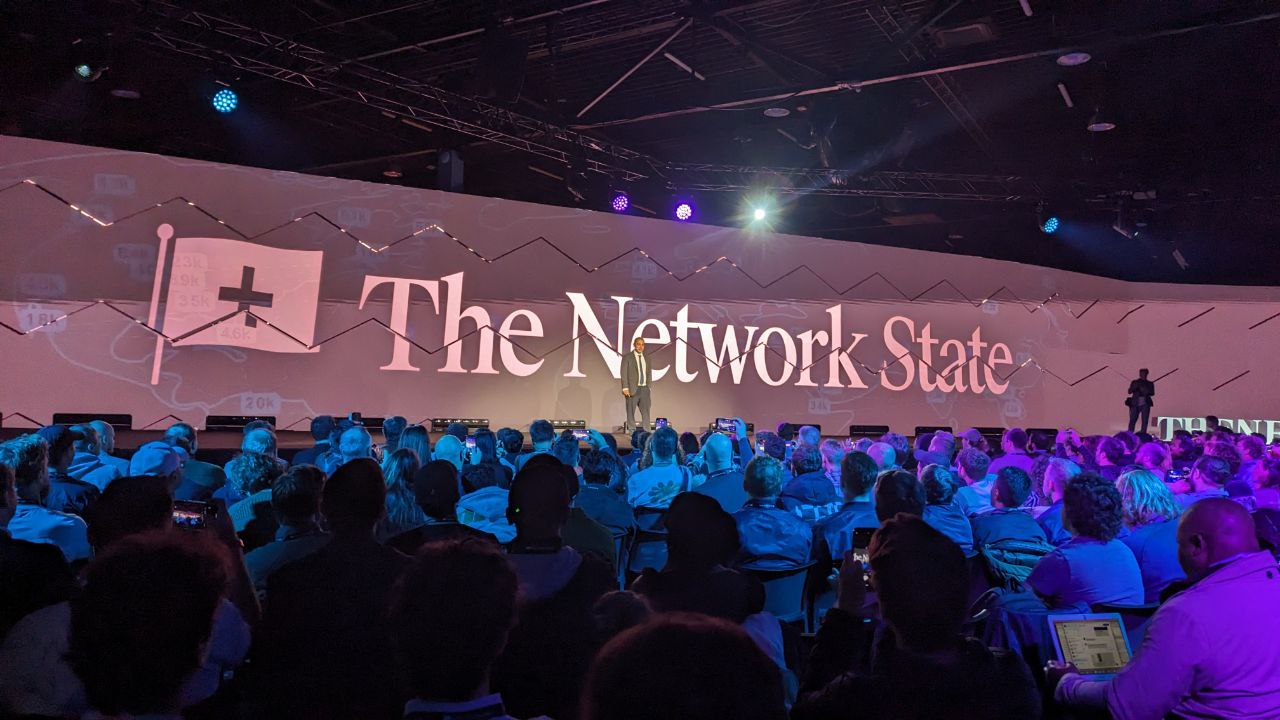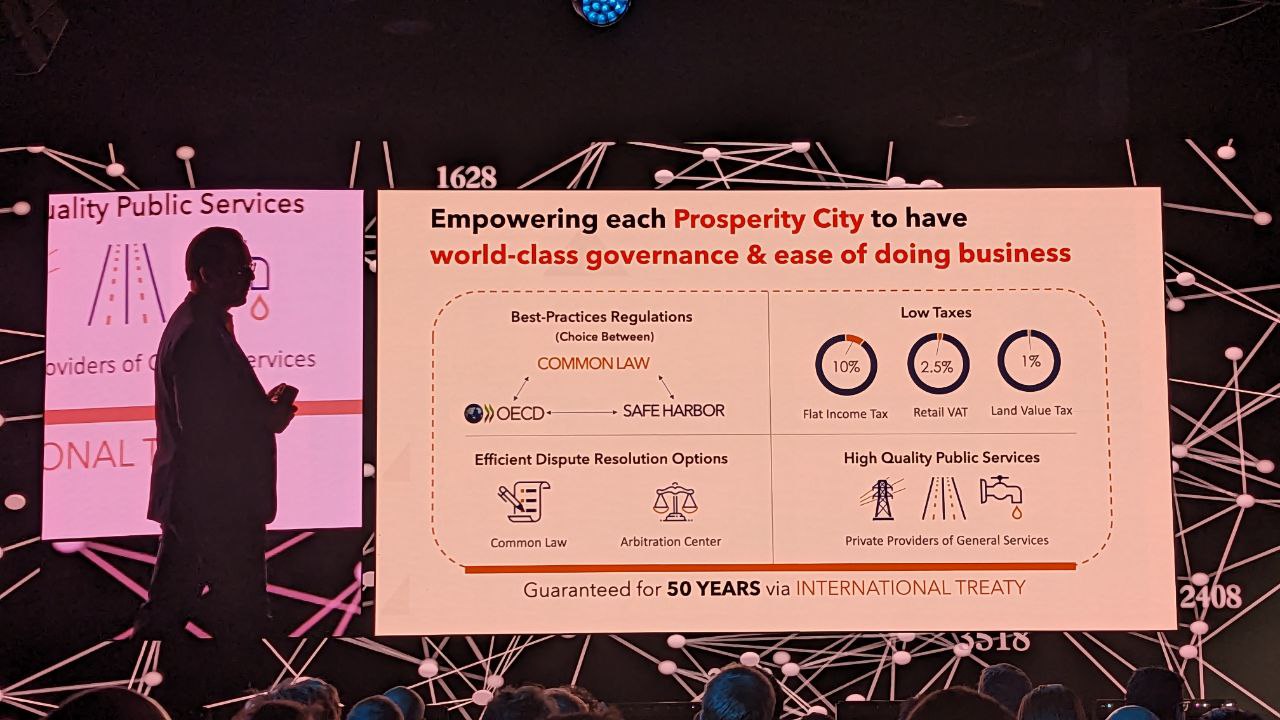The Dutch city of Amsterdam – no stranger to international conferences dedicated to cryptocurrencies, blockchain and decentralization – recently hosted the Network State Conference, which explored decentralization on a whole different level.
Speakers and conference participants gathered to discuss and debate whether a new form of a decentralized country is possible.
The conference started with an energetic host directing the audience to sing and shout the title before Balaji Srinivasan, an entrepreneur, investor and former chief technology officer of Coinbase, entered to deliver his opening speech. During his first remarks, Srinivasan asks, “Are new countries even possible?”

Srinivasan delivered an opening address for the Network State Conference. Source: Cointelegraph
In his book The network status, Srinivasan proposes that new lands are possible through a new type of digital community, where members use blockchain and cryptocurrencies to house their social and economic institutions, and the borders are at the ends of the crowdfunded land owned by community nodes.
A hub can start with just a small group of friends, the idea being that this small community organizes itself to raise money, expand and eventually form a viable network hub. If you have multiple well-coordinated community nodes, regardless of their geographic distribution, you have the foundations of a network state.
There are many goals among proponents of network states, who primarily want to build a parallel social infrastructure as a ‘competing product’ for what they see as the flawed systems of social, political and economic institutions at the state level, thereby enabling citizens of such nations to to withdraw when established social structures prove insufficient for their needs and desires.
Ivy Astrix, a member of vibecamp and long-time supporter of Srinivasan, told Cointelegraph that disillusionment with the establishment was a common theme among attendees. “Can society, the US, these very cohesive societies – still function? “I don’t think they can,” she said.
Amid this growing disillusionment with existing societal structures, Astrix said that network states “can improve the lives of ‘normal’ people. […] because they encourage a co-creation approach to life, rather than just shoving yourself into something that’s already there just because it’s the ‘best’ or ‘least sucking’ option.”
The connection between network states and blockchain technology is undeniable, as both rely on autonomous nodes coming together to form a network with an agreed upon set of rules. For the network state concept, crypto rails are the gold standard of their ethos, especially when it comes to finance.
Frederik Zwilling of Galactica Network told Cointelegraph about the practical feasibility of this union:
“The users will not go to the network state for themselves unless there are a lot of benefits or things they want to do in this network state that attracts them.”
Zwilling added that cryptocurrency-based, decentralized solutions are necessary for the governance of community groups – especially for those that require analogues of social infrastructure at the national level.
The physical implementation of a network state
The infrastructure development underlying the network state concept is moving over several decades, with projects like Prospera, Cabin, and Praxis focusing on community building, fundraising efforts, and building physical locations (nodes) that could ultimately form a true network state . .

Erick Brimen, the founder and CEO of Prospera, presented the project to the attendees. Source: Cointelegraph
Many of the speakers have opened exploratory dialogues with various governments of existing nation states on land ownership, borders and the formation of special economic zones.
Yet no community has achieved the level of autonomy over older systems embraced by proponents of the network state concept.
Prospera’s flagship city, St. John’s Bay, almost meets these criteria, but is still primarily under the jurisdiction of traditional institutions, in this case the Honduran government.
Creating parallel societies is a task that will take decades, and to achieve the network effects necessary for a minimally viable society, the process must begin with the kind of community building we witnessed at the conference.
Considering the early stage of network states, the quality of the physical infrastructure is impressive, and the concept itself seems solid, but to grow beyond wealthy futurists taking over resorts will require much more time, money and human infrastructure to forego become a viable choice.
The democratization of governance through technology, especially that of blockchain, is a key pillar of the network state concept and is crucial for the real infrastructure presented at the conference.
Dom Ryder, founder of Vemp Studios, told Cointelegraph: “It’s about finding ways to facilitate democracy and democratic values on an immutable and trustworthy blockchain; that’s the obvious use case [of network states] to me.”
The challenge, Ryder continued, is making the value of blockchain tangible for “normies,” while shedding the technology from its poor public perception and ensuring its benefits are seamlessly integrated into the lives of everyday people.
Aligned individuals
You could be forgiven for thinking that many of the speakers at the Network State Conference were simply presenting new methods for what essentially falls under the umbrella of “virtual community building,” but this line of thinking perhaps underrepresents the coherent yet flexible nature of their shared ideas. goals.
Advocates of network states do not suggest a one-size-fits-all approach to social cohesion, but rather an open system from which you get out what you put in, with as few intermediaries as possible between action and effect.
Community is the fundamental building block of all aspects of society, and it has been proven throughout history that a critical mass of community pursuing a common goal will at least reach the implementation stage of that goal. Success can never be taken for granted, but the power of network effects cannot be denied.
The virtual communities present at the conference, from the network state.
Attendees seek to achieve the critical mass of humanity necessary for a parallel society to take shape and provide the necessary digital infrastructure to meet some or all of humanity’s basic needs, whether financial, political or being social.
The Network State Conference was a melting pot for people and ideas that challenge the status quo and a small pit stop on the journey of human development.
A pragmatic mind might wander to the inescapable truth that a network state paradigm depends on acceptance by, or even the staggering failure of, the current social infrastructure.
However, the sheer will and monumental human effort on display here gave reason enough to suspend disbelief – if only temporarily.

